Director Scott Hannah is still happy to work at every level and his regard for technology and compliance is high
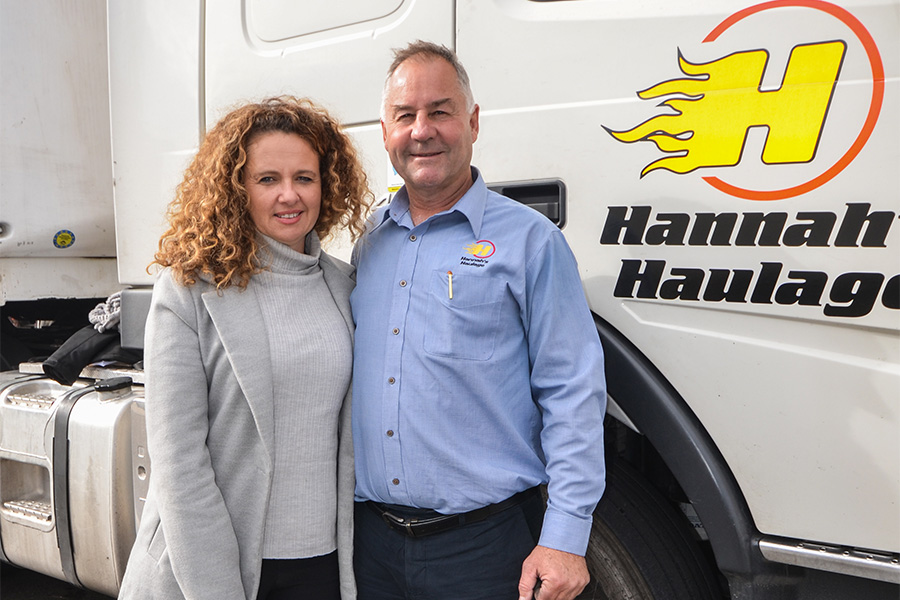 |
|
Julie and Scott Hannah
|
As far as yards go, the western Sydney premises that Hannah’s Haulage occupy would have to be one of the more unusual.
Located in historic Riverstone, on the border of city and country, the buildings were an abattoir in their former life, and the land is set in a depression that can sometimes flood up to the first floor window.
Farmland laps at the margins and disused train tracks give a ghostly feel.
For director Scott Hannah, the place has done him well – it’s cheap for one thing – but it’s time to move on.
He’s just bought two and a half acres nearby in Rouse Hill, where he’ll be building his new yard to run Hannah’s Haulage and his warehousing arm, Platinum Warehousing.
With 26 prime movers, 40 trailers and a turnover around the $10 million mark, the $4 million investment in the new premises makes sense.
Fifty per cent of the business is interstate linehaul around the east coast, 20 per cent is servicing the construction industry, mostly with crane trucks carting pipes, and the remainder is local and warehousing.
Things weren’t always looking so rosy for Hannah though.
In fact, to still be here, let alone be in this position is nothing short of a miracle considering the calamity the business faced only six years ago.
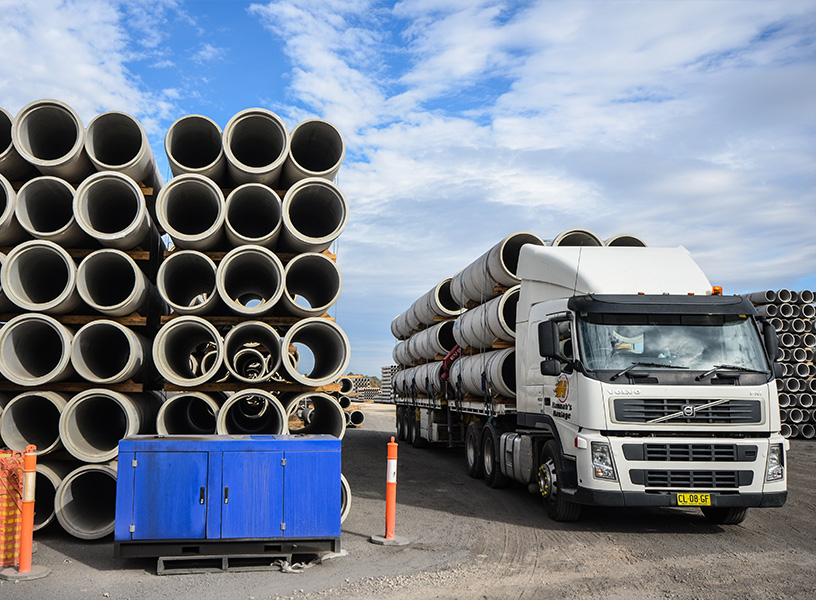 |
|
Pipes dominate the construction yard in Riverstone
|
Near-death experience
A mechanic by trade, Hannah was driving trucks by 21, and bought his first 6-tonner in 2000. The business rapidly grew as they took on a major customer, Couriers Please.
Buy-outs and takeovers meant that Hills Transport eventually became Hannah’s major customer, until DHL bought it up and closed it down, leaving Hannah with a bunch of trucks but no customers. He puts in simply.
“I went back to nothing.”
While you could forgive Hannah for packing things in, or allowing the stress of the situation to get to him, neither is his style.
His calm demeanour saw him evaluate the problem and work through solutions step by step.
“I made phone calls, went back to driving the trucks,” he says.
“That didn’t bother me. I got work from some people I knew. We basically just looked people up in the phone book.”
Eventually, more work rolled in.
They got Visy to load them out of Shepparton, slowly won more customers as word of mouth got around.
But equally important to winning new customers was to save money, and it’s here where Hannah is truly a master.
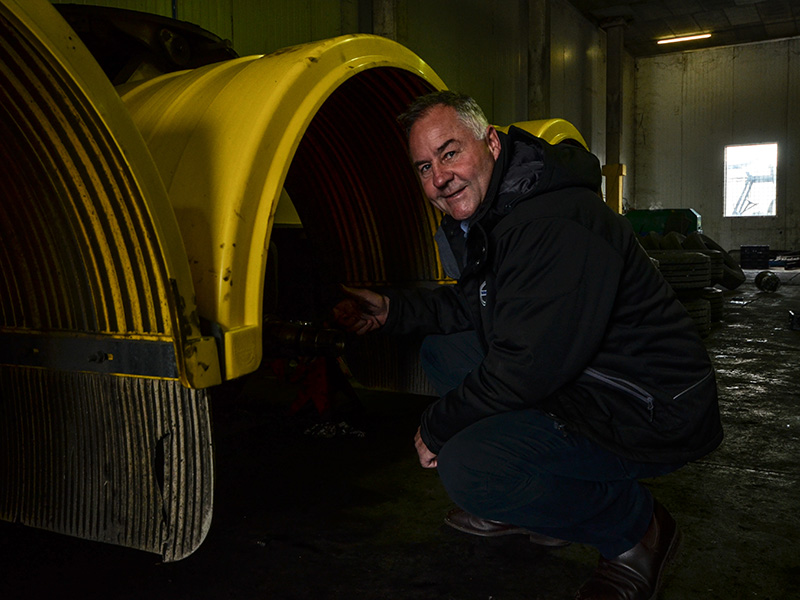 |
|
A mechanic by trade, Scott Hannah still likes getting his hands dirty
|
Penny saved, penny earned
Hannah saved by doing his own maintenance on the trucks, helped by his father, himself a truck driver.
A lot of the work would be done at home, on Hannah’s five acre block. With his previous trailers all being supplied by Hills, he was also left trailer-less.
He bought cheap, second-hand trailers and fixed them up himself, then suffered a second set-back when one of the trailers he had spent $12,000 repairing was stolen.
Second-hand trucks were also the order of the day; he bought his first new truck only three years ago. Being in the Riverstone premises has meant cheaper rent and warehousing costs.
The warehousing arm was structured around long-term storage – one customer has over 2000 tonnes of washing powder that’s been sitting there for four years – freeing up the warehouse manager to get out and drive the trucks, reducing labour costs. Some trailers are used for advertising.
“A trailer is really a big billboard,” Hannah says. “If someone wants to pay for it, happy days…”
Trailer maintenance is still done on-site by a contract mechanic, with Hannah always on hand to cast his eye over brake drums and other frequently replaced parts.
He still loves getting his hands dirty and inspecting the gear, seeing which pads are worn and which ones still have meat on them.
Having drivers on set runs also saves on costs, as there is less time spent scheduling.
“Our stuff is all one drop, one pick up, so we can do that manually quite easily. But our growth has meant we’ll need to get a system soon.”
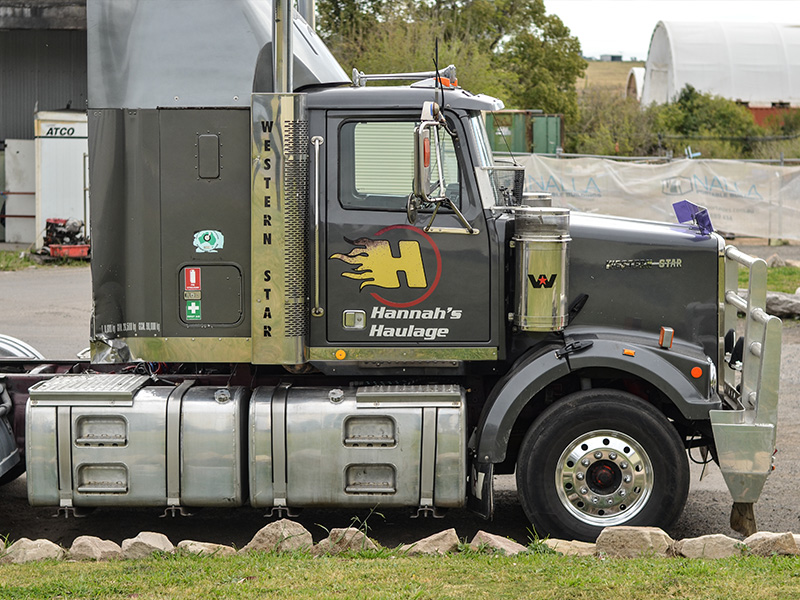 |
|
The ‘old girl’ Volvo, spruced up and ready to roll
|
Volvo-led fleet
Hannah says he used to run primarily American, and he still has a soft spot for his 2007 Western Star with a CAT15.
“It’s got a platinum rebuild, new gearbox, new clutch. I’m going to put a new set of diffs in. It’s done a couple of million kilometres.
“We’ll keep the old girl, she’ll go back on the road.”
Hannah says he looked around for a product that would better suit the general fleet and decided to go with Volvo. He’s got 20 now; mainly 600 Globetrotters, but also 540s, 500s, 450s and one 700.
He also has what he believes may be the only B-double crane truck, for handling his construction freight.
Hannah can’t speak highly enough of the service provided by Volvo. “They treat you like family,” he says.
He’s gone from spending every weekend in his overalls doing his own maintenance to using Volvo’s full contract maintenance.
“Their after sales support is exceptional. Plus the fuel economy is good, there’s plenty of room in the cabs and plenty of power.”
Game theory
But it’s the Volvo-supplied fleet management system, Dynafleet, that Hannah is particularly rapt with.
For a start, it saves him from having to buy or lease a more expensive system and gear it to his requirements. From his iPad, Hannah has all the information about the fleet at his fingertips.
“It tells you exactly how every truck is running.”
Hannah opens the iPad and brings up details for one truck and runs down the list of parameters.
“This is the last seven days fuel economy for this truck, the carbon footprint, total running time, percentage of time spent in top gear, engine loading, over-speed, even how many times the driver has touched the brakes. It’s all here; all monitored.”
The thinking behind this is a kind of gamification: turning a job into a type of game to drive improvements.
Drivers can now ‘compete’ with each other to see who is the better driver, and who might have spent a little too much time idling to keep the heater running.
An essential feature for someone who keeps such a close watch on costs is the finance application of Dynafleet.
“You put your costs in for every truck.
“It gives you a pie chart with depreciation, monthly repayments, everything like that.
“It means that you can punch in your costs when you’re going for a new contract and it will tell you how many cents per kilometre you need to pay for the truck.”
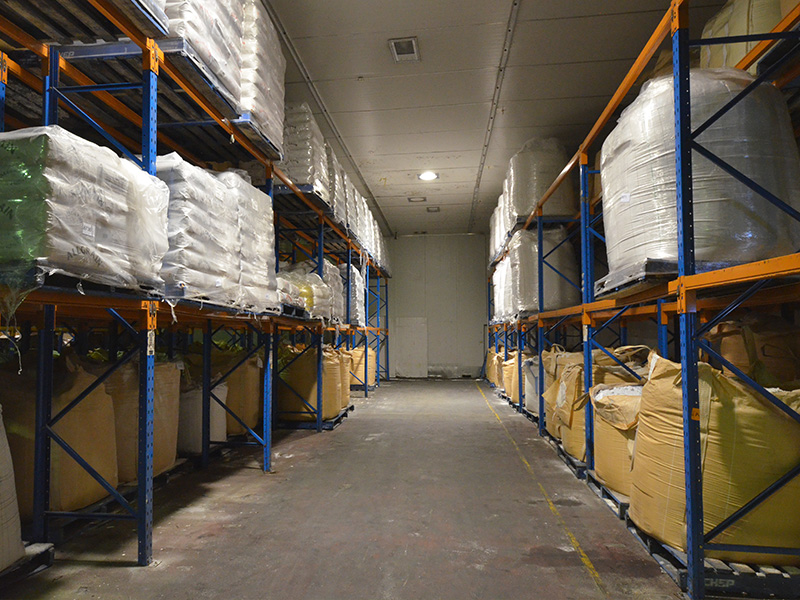 |
|
The Platinum Warehousing arm of the business. Washing powder storage on right
|
Compliance imperative
Hannah has a word of advice for young drivers starting out: get compliant.
It’s something he’s never had a problem with, though; if anything, keeping up with the National Heavy Vehicle Regulator (NHVR) has opened up opportunities.
“There are new compliance regulations for being allowed on government sites, and unless you’ve got them you won’t be getting on site,” he says.
“It means that next year there will be a lot of people who won’t be able to work.
“If you’re not compliant with NHVR, you just won’t be getting in.”
Hannah’s Haulage is accredited under National Heavy Vehicle Accreditation Scheme [NHVAS], and Hannah is already perusing the NSW compliance changes being brought in next year to make sure he’s ready.
“We’ve got our own safety and compliance software, FormConnect, which we’ve personalised for us. We can show this to NHVR.”
Hannah believes his strict adherence to staying abreast with the ever-increasing compliance standards will win him jobs going forward.
He also believes the time has come for a searchable register of compliant operators to become available.
“It’s not easy to find blokes who are compliant. It’s still word of mouth. Compliance is everything. If you don’t it you won’t have a job in two years.”
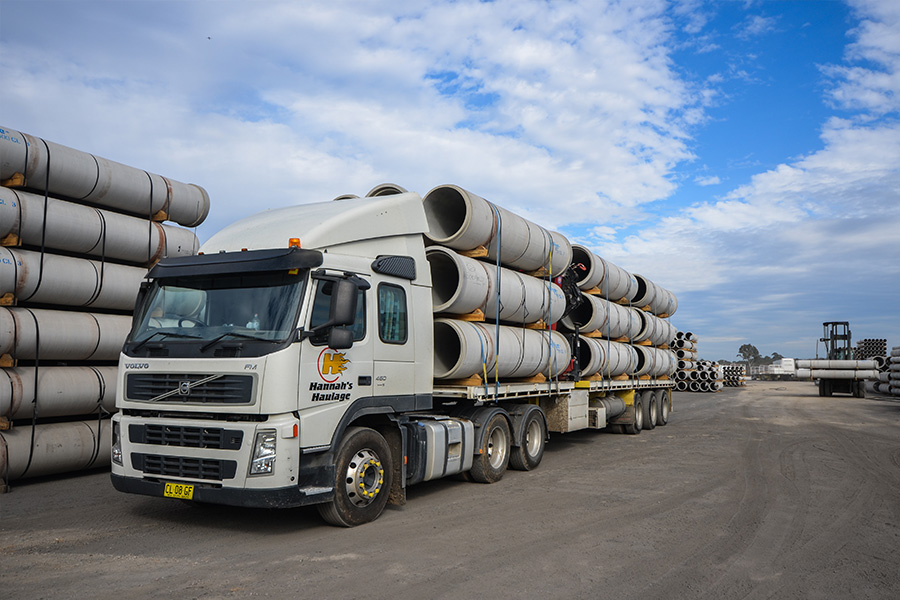 |
|
Construction transport makes up around 20 per cent of Hannah’s Haulage’s business
|
Support and training
Drivers at Hannah’s Haulage know they can ring the boss at any time. In fact, they’re expected to if they’re ever unsure about anything.
Hannah’s experience and know-how generally means he solve problems like an awkward tie-down, or broken equipment, from a photograph and a brief chat.
“The drivers know to send me photo and ask, ‘is this right?’ They won’t move until they check with me.”
Many drivers are young, including 27 year-old Amanda Moffitt.
“Amanda was honest with us when she applied. She said she didn’t much experience, but that was fine. We’ll give her that experience.”
Investing in young talent means they haven’t learnt bad habits, and that Hannah can train them as they go.
Hannah’s wife, Julie, is administration manager at the business, and knows the importance of having a good team around you.
“We’re good listeners, and we’re not afraid to retrain people and shape them into a new role.”
She’s seen Scott go through the good times and the bad.
“Scott is a mastermind. He knows the industry so well, not just from a transport perspective but as a mechanic. His knowledge is profound and he’s able to use that knowledge to save money. He’s very clever and very calm.”
It’s no surprise to hear Julie describe her husband as calm.
You’d have to be to pick yourself up after losing virtually all your business in one hit.
But Scott Hannah isn’t one to shy away from doing what needs to be done.
He’s learned lessons along the way, number one being don’t put all your eggs in one basket.
He doesn’t mind dishing out a few surprises, and finishes with a story.
“This guy drove in the yard this morning and I was on forklift unloading a truck. He comes up and asks if he can speak to the owner. I said to the guy, ‘That’s me.’ And the guy just looked at me and said, ‘You’re joking.’”
Check out the full article in this month’s ATN.

